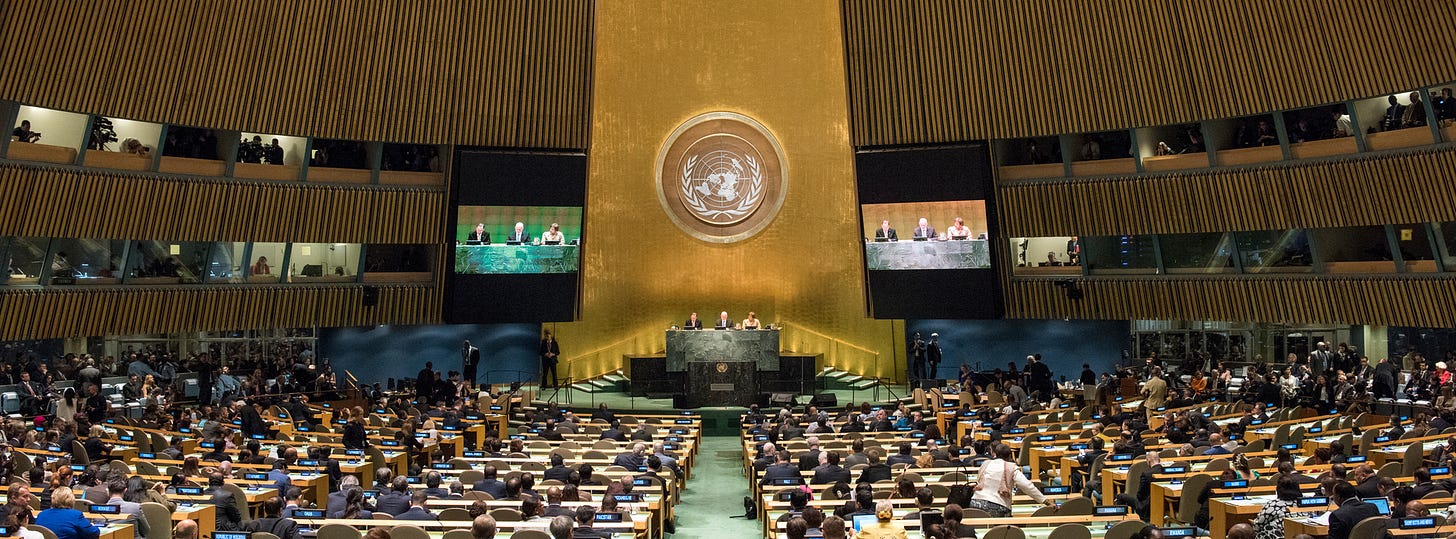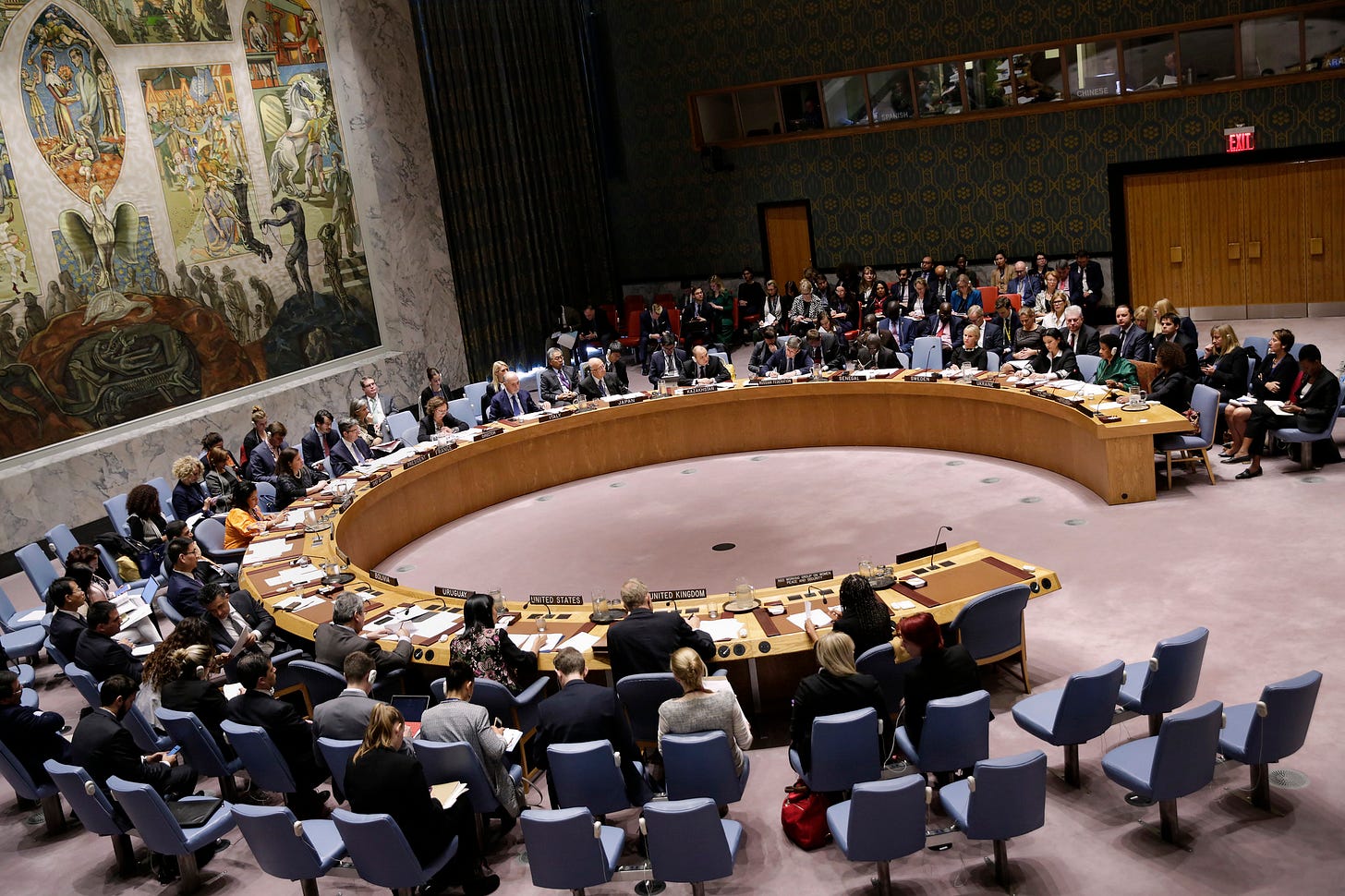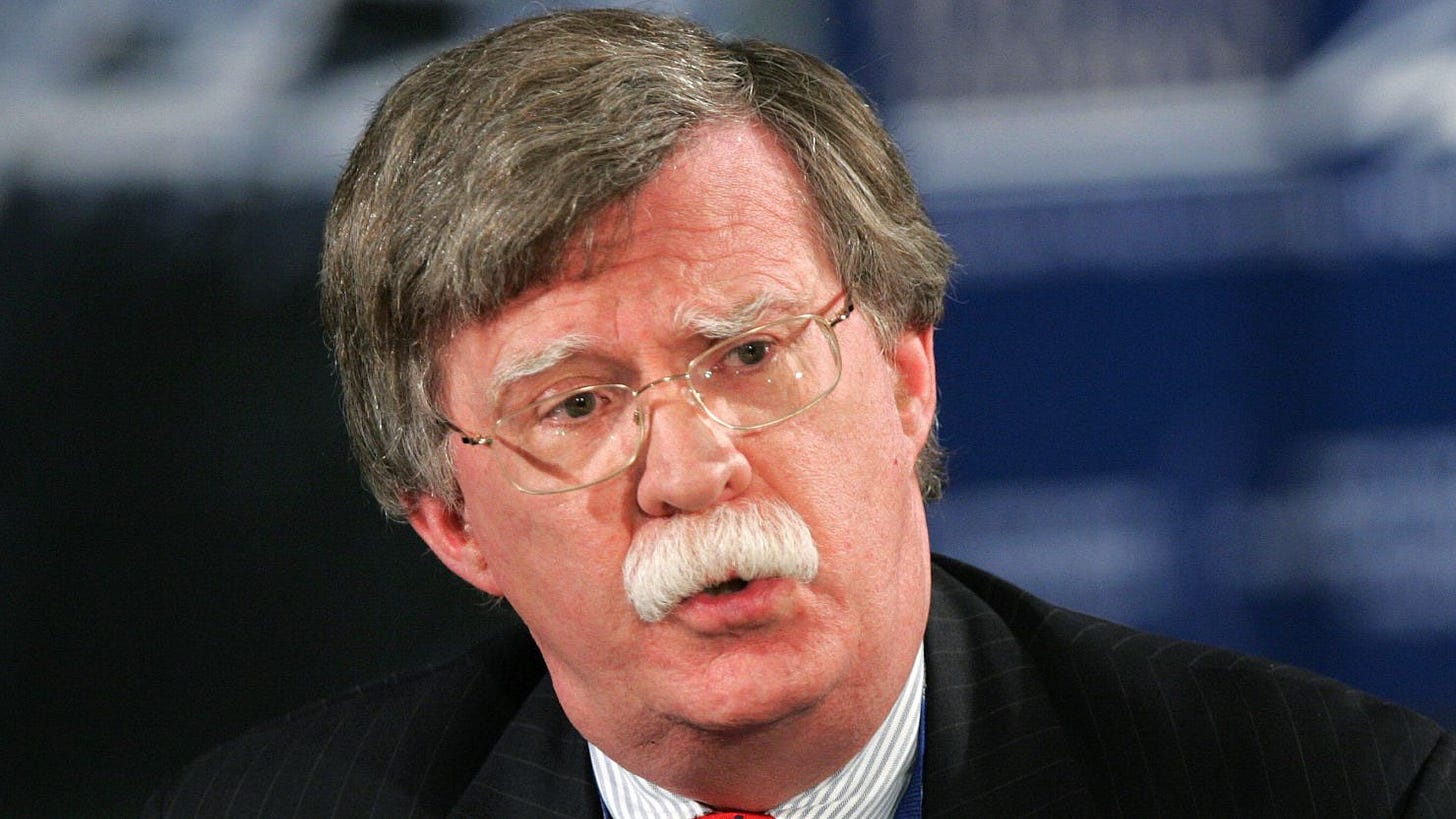Does the United Nations make sense?
The UN is a flawed body which preaches absolute moral principles which it can never achieve: how do we come to terms with that in practical politics?
The existence of the United Nations as an international organisation comprising every undisputed sovereign state in the world is perhaps the most basic assumption of foreign policy. There are 193 member states—the most recent accession was South Sudan in 2011—two observer states, the Holy See and Palestine, and two non-member states with “full treaty-making capacity”, the Cook Islands and Niue: these are both self-governing states in free association with New Zealand which participate in several UN agencies but have not applied for membership.
Only one country, Indonesia, has sought to withdraw from the United Nations. When Malaysia, with which it was engaged in an undeclared war, was awarded a seat on the Security Council at the beginning of 1965, the country’s president, Sukarno, declared “that Indonesia has walked out of the United Nations… only through our overcoming difficulties can we become a great nation. Now march onward, ever onward, never retreat.” The UN affected in many ways to ignore the move, continuing to count Indonesia as a member and flying its flag, and in September 1966, after a military coup led by General Suharto stripped Sukarno of most of his powers, the country resumed its membership.
Shortly after his election as president in June 2016, Rodrigo Duterte threatened to withdraw the Philippines from the UN. He warned the organisation in a press conference, “If you are that disrespectful, son of a whore, then I will just leave you”, and mooted an alternative body, to which “I would invite everybody. I would invite maybe China, the African (nations)”. Nothing came of this. Indeed, the United Nations Charter, which came into force in October 1945, contains no provisions for a member state to withdraw. However, under Chapter II, Article 6, a state can be expelled, but this has only happened once, when in 1971 under UN General Assembly Resolution 2758 the Republic of China (Taiwan) was removed and the People’s Republic of China was admitted in its place as “the only legitimate representative of China to the United Nations”.
Inevitably the UN has grown in fits and starts, but increasing stability of borders, or perhaps the inability of border conflicts to be resolved definitively, has meant that it has admitted only nine new members in the last quarter-century: Kiribati, Nauru, Tonga, Tuvalu, Serbia, Switzerland, Timor-Leste, Montenegro and South Sudan. The UN also maintains a list of “non-self-governing territories”, of which there are currently 17, but this is a political gesture of so-called decolonialisation: 10 of the 17 are British Overseas Territories which have no significant intentions to seek self-governance and another three are unincorporated territories of the United States. The only genuinely disputed territory is Western Sahara, 80 per cent of which is under Moroccan occupation.
The issue of membership has appeared in the news headlines because of renewed pressure for Palestine to be recognised as an independent sovereign state. On 10 May, the General Assembly passed a resolution granting Palestine additional rights within the United Nations and calling for its admission as a full member. Decisions on membership, however, are made by the Security Council, not the General Assembly, and there is no prospect of such a measure being passed there imminently. I pointed out in The Hill earlier this month that, irrespective of the theoretical merits of Palestine’s case, it simply does not currently exist as a recognisable state or government: there is nothing to admit. To take such a major step would be at best a symbolic gesture.
The issue of Palestinian membership does, however, bring into focus a contradiction at the heart of the United Nations which has never been solved—because it is definitionally insoluble—but which bedevils the organisation on an ongoing basis. The UN is based on two incompatible assumptions: that all sovereign nations are equal, and that all sovereign nations will behave in a fair, equitable and legal manner, in accordance with the principles of the charter. We know that this is not true.
The first proposition is foundational. Chapter I, Article 2 of the United Nations Charter declares that “the Organization is based on the principle of the sovereign equality of all its Members”, which means that, in theory, Tuvalu, a nation of fewer than 12,000 people, has the same standing as the United States or China. If this principle were not observed, then of course the organisation would be pointless: its purpose is to regulate and equalise the relations between states, and take away the inherent advantage of the large and economically and militarily strong.
Of course, in practice there is one inequality hardwired into the UN. Many executive functions, including the ability to issue legally binding resolutions, are vested in the Security Council, a 15-member body; but five of these members are permanent and have the power to veto resolutions, while the 10 non-permanent members hold their seats by rotation according to geographical area. They are elected by the General Assembly for two-year terms. The permanent members, of course, are the United States, the United Kingdom, Russia, France and China, essentially the chief victors of the Second World War. (As noted above, the People’s Republic of China replaced Taiwan in 1971, and Russia was recognised as the inheritor of the Soviet Union’s seat at the beginning of 1992.)
There have long been calls for the permanent membership of the Security Council to be re-examined. In 2005, the secretary-general, Kofi Annan, proposed a programme for reform, suggesting either the creation of six new permanent members and three non-permanent members, with the Security Council increasing to 24; or one additional non-permanent members and eight members in a new class which would serve for four years, subject to renewal, again increasing overall to 24. Separately, later that year, a group of members calling themselves “Uniting for Consensus” proposed maintaining five permanent members but increasing the non-permanent members to 20. None of these proposals was put into effect.
The most frequently mooted additional permanent members, reflecting more accurately contemporary economic and military strength, are Brazil, India, Germany and Japan. The last two were of course not in contention for places in 1945, while India was still a British possession, though it had been a member of the League of Nations from its inception in 1920. However, some medium-sized and smaller member states argue that the addition of any or all of those countries would simply perpetuate the dominance of large and powerful nations, which is hardly the purpose of the organisation.
Nevertheless, in broad principle, the United Nations is an international association of 193 nations on an equal footing. Membership is dependent, according to Chapter II, Article 4 of the UN Charter, on being “peace-loving states which accept the obligations contained in the present Charter and, in the judgment of the Organization, are able and willing to carry out these obligations”, as recommended by the Security Council and approved by the General Assembly. But we know that is a fiction. Egypt has been a member state since October 1945, despite participation in the invasion of Israel in 1948, Iraq has been a member state since December 1945, notwithstanding its invasion of Kuwait in 1991, and Russia remains a member despite currently pursuing a war of aggression against Ukraine. So “peace-loving” is not a condition which is rigorously observed or enforced.
Equally, there is a pretence that all member states adhere to rigorous standards on human rights, the UN having adopted the Universal Declaration of Human Rights in 1948. These rights were promoted by the UN Commission on Human Rights until 2006, when it was replaced by the UN Human Rights Council. All member states are eligible for appointment to the UNHRC, even though we know perfectly well that, for example, Saudi Arabia is an absolute monarchy with no democratic institutions of power, while China is engaging in systematic repression, perhaps genocide, of Uyghurs, Kazakhs and other predominantly Muslim ethnic minorities. So we have absurdities like the appointment in November 2023 of the representative of Iran as chair of the UNHRC’s Social Forum, despite the fact that most people would agree that Iran’s human rights record is poor.
These absurdities, however, are not a bug but a feature. The appointment of the Iranian representative, Ali Bahreini, to chair the Social Forum was questioned in the European Parliament, and the United States’ representative on the UNHRC, Michèle Taylor, boycotted the meeting, but there is no institutional way in which it could have been avoided. All members are equal, unless some drastic action is taken as in March 2011 when Libya was suspended from the Human Rights Council following President Gaddafi’s crackdown on anti-government protestors.
Here is the essential flaw in the United Nations. It purports to act as a body of principle and international law, but its very structure has realpolitik and manifest absurdity baked into it. When Russia invaded Ukraine in 2022, for example, it was a foregone conclusion that the Security Council would take no meaningful punitive action because Russia, as a permanent member, holds veto power. Equally, Israel has long operated in the knowledge that the United States, its close ally, will veto measures in the Security Council which would materially damage its interests.
But where does this lead us? There is no shortage of critics of the UN, on moral, philosophical, administrative, structural, ethical and financial grounds, and indeed on the basis of sheer ineffectiveness. The failure to prevent genocide in Rwanda in 1994 remains a black mark against the organisation’s ability to act as a global policeman and saw perhaps as many as 800,000 people killed in unimaginably brutal ways. In 2005, President George W. Bush created consternation by appointing as the US permanent representative one of the UN’s harshest critics, John Bolton, then under-secretary of state for arms control and international security. Bolton had told the World Federalist Association Forum in February 1994:
There is no such thing as the United Nations. There is an international community that occasionally can be led by the only real power left in the world and that is the United States… if the UN secretary building in New York lost 10 stories, it wouldn’t make a bit of difference.
He was also reported to have said that “If I were re-doing the Security Council today, I’d have one permanent member (the US), because that’s the real reflection of the distribution of power in the world”. Yet even this fire-breathing iconoclast, who was at the United Nations for 16 months, achieved little transformative change. He won the good opinions of The New York Times in 2006 when he criticised the UN Commission on Human Rights, and said bluntly of its replacement, the UNHRC, “We want a butterfly. We don’t intend to put lipstick on a caterpillar and call it a success”.
But attempts by Congress to cut the United States’ funding for the UN failed: in 2005, the US paid $1.25 billion to the UN, 41 per cent of its budget. Under President Donald Trump, the United States withdrew from participation in UNESCO and the UNHRC, and announced its intention to withdraw from the World Health Organization, but all of these measures were reversed by the succeeding Biden administration.
No other country has made a serious attempt to withdraw from the UN. In 1967, Gilbert Longden, Conservative MP for South-West Hertfordshire, acknowledged in the House of Commons “a right wing fringe which would have us withdraw from the United Nations”, but argued that “the truth is that no responsible person who reads its [the UN Charter’s] Preamble could fail to support what the United Nations is trying to do”. But there has been no serious suggestion of withdrawal since that time, and Longden put his finger on the problem: it is near-impossible to disagree with the principles in the UN Charter, but the question is whether they are remotely advanced or protected by the organisation.
The question, in essence, is whether it is better to have an imperfect organisation dedicated, however ineffectually, to the promotion of peace and the non-violent settlement of international disputes, or whether the United Nations by its nature damages that cause by its failures. It is an academic question, of course, while the existence of the UN is taken as an unchallengeable part of the dogma of foreign policy. What we ought to do, however, as politicians, advisers, practitioners, commentators, analysts and academics, is be realistic about the organisation which was established in San Francisco in the summer of 1945. Its genesis, as the unfathomably destructive Second World War came to its conclusion, was understandable: though remember that when the UN Charter was signed, the US had yet to drop the first atomic bomb.
Nevertheless, the UN is not a body which has theoretical perfection to which we can get closer and closer by effort and goodwill. It will never fully achieve the ambitions enshrined in the Charter because it cannot. Partly that is a structural problem—the composition of the Security Council and the powers of its permanent members—but it is also a simple reflection of the human condition. No legal system will ever prevail without an effective and impartial mechanism of law enforcement, and the United Nations can never have such a mechanism. The best result we will ever achieve is the relatively effective operation of systemic imperfection.






